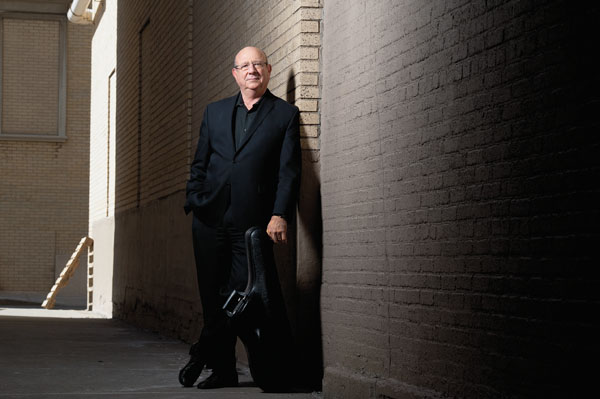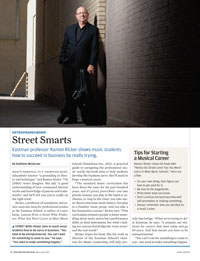In Review
 STREET WISE: Ricker aims to teach music students how to be savvy in business. “You have to be entrepreneurial. You can’t wait for something to come to you,” he says. “You need to make something happen.” (Photo: Adam Fenster)
STREET WISE: Ricker aims to teach music students how to be savvy in business. “You have to be entrepreneurial. You can’t wait for something to come to you,” he says. “You need to make something happen.” (Photo: Adam Fenster)What’s essential to a thorough music education? Answer “a grounding in theory and technique,” and Ramon Ricker ’73E (DMA) won’t disagree. But add “a good understanding of how compound interest works and knowledge of patents and trademarks,” and he’ll tell you you’re really on the right track.
Ricker, a professor of saxophone and senior associate dean for professional studies at the Eastman School, is author of a new book, Lessons from a Street-Wise Professor: What You Won’t Learn at Most Music Schools (Soundown Inc., 2011). A practical guide to navigating the professional music world, the book aims to help students develop the business savvy they’ll need to forge a musical career.
“The standard music curriculum has been about the same for the past hundred years, and it’s pretty prescribed—you take private lessons; you play in the band or orchestra, or sing in the choir; you take music theory and some music history. You play in a chamber music group. And you take a few humanities courses,” Ricker says. “That curriculum prepares people to know something about music and to have performance skills on their instrument, but what’s lacking are courses that bridge the ‘ivory tower’ and the real world.”
Tips for Starting a Musical Career
Ramon Ricker closes his book with “Ninety-Six Street Level Tips You Won’t Learn in Most Music Schools.” Here are a few:
- Do your own thing, then figure out how to get paid for it.
- Be nice to the stagehands.
- Write down what you know.
- Don’t confuse entrepreneurship with self-promotion or making something.
- Always remember why you decided on a music career.
Ricker hopes his book, like his work as director of the Eastman School’s Institute for Music Leadership, will help provide that bridge.
“What we’re trying to do” at Eastman, he says, “is prepare our students for careers that start today and go 50 years. And that means you have to be entrepreneurial. “You can’t wait for something to come to you—you need to make something happen. You can craft what you do around your interests, talents, and abilities.”
The entrepreneurial nature of music is nothing new, Ricker says, calling Mozart and Beethoven musical entrepreneurs of their day. “Music has never been a job or an occupation where you just plug into something. You don’t have it ready-made for you. You have to create it,” he says.
Emmy Award winner and Eastman alumnus Jeff Beal ’83 calls the book “an essential guide for success on artistic and entrepreneurial terms that leverages that crucial aspect of any artist’s life journey—the passion to create, and to share that creativity with the world.”
Ricker’s advice in the book grew out of a course he’s taught for 20 years, Entrepreneurship in Music. It also mirrors a larger effort at the Eastman School to ensure its graduates are ready for the 21st-century musical marketplace. Established in 2001 with support from the Andrew W. Mellon Foundation, the Institute for Music Leadership has influenced the traditional curriculum at Eastman and guided students in taking an entrepreneurial approach to their careers, with courses, workshops, and other initiatives.
“It’s so easy, depending on your teachers, not to be prepared for a life in music,” Ricker says. “You can know an awful lot, but you’ll need to figure out how to survive. And many of the things I talk about in the book, and that we teach at Eastman, are things professional musicians would learn in the first five to ten years of their careers. We’re trying to smooth out the road and get rid of those speed bumps.”
With about 150 jobs opening each year in the nation’s top 50 orchestras—for all instruments combined—the keys to surviving and thriving are “street-level tactics and mindsets,” Ricker says.
He draws on his own experience in a varied 50-year-career. A professor, performer—he’s been a member of the Rochester Philharmonic Orchestra for 38 years—and author of books on jazz improvisation and saxophone technique, Ricker credits his entrepreneurial thinking for his success.
“Sometimes to get a gig, all you have to do is ask,” he says. “You go into a bar, or even a bank, and ask the managers if they would like music. “Musicians are small businesses, and we can’t wait for something to happen—we’ve got to make it happen. And the good news is we’ll never get bored if we do that.”

